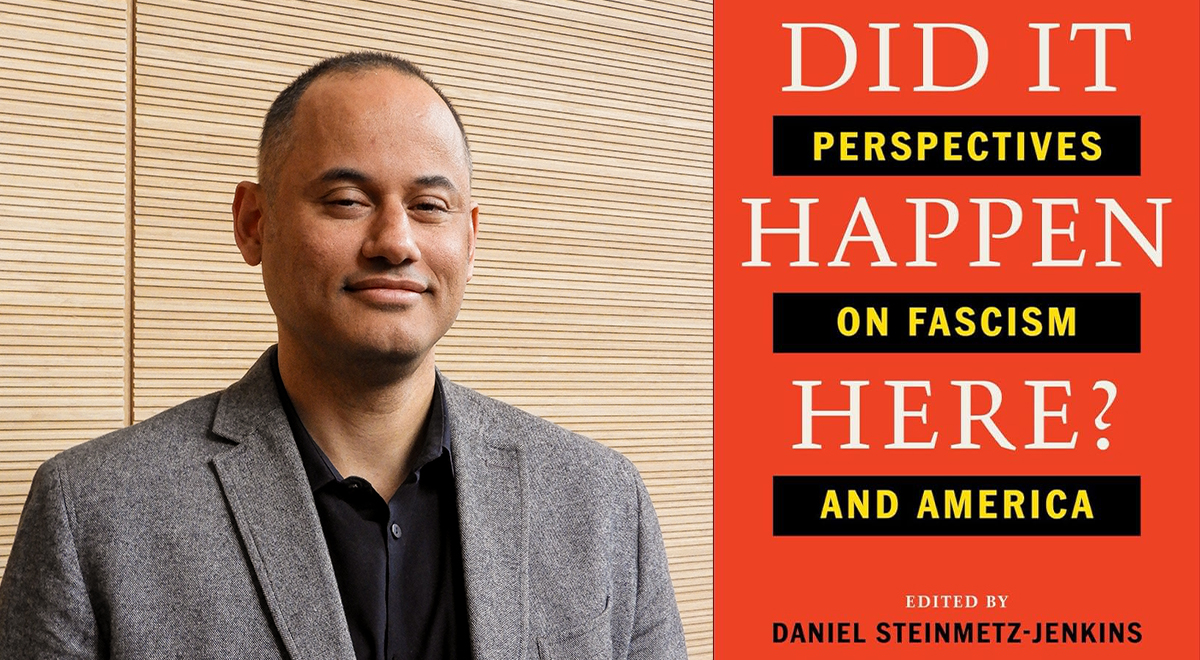Did It Happen Here?

Since the 2016 presidential election of Donald Trump, legal scholars, political pundits, professors of history, and others have debated whether the United States has taken a turn from democracy toward fascism. Some say it has. Others argue it has not.
The very uncertainty about what has or has not happened gave rise to Assistant Professor of History Daniel Steinmetz-Jenkins’ new book, “Did it Happen Here? Perspectives on Fascism and America.” It’s an anthology of texts from thought leaders from certain periods in the 20th and 21st centuries who take positions on the state of fascism in America. Many of the pieces were written between 2016 and 2020, bookending Trump’s election and defeat.
Steinmetz-Jenkins said the idea for the book grew out the History in the Present class he teaches at Wesleyan. For the 200-level course, Steinmetz-Jenkins and his students examine pressing issues.
“We use history to understand what’s going on in the world. And with Trump’s election, we’ve obviously read all these pieces about whether he’s a fascist or not,” he said. “I was thinking about what should be on the syllabus and clearly the question of fascism was one of the first things that came to mind.”
When Trump was elected, many people struggling to make sense of his victory sought understanding by studying important periods in history, such as the rise of Nazism in Germany and the fascist period in Italy, Steinmetz-Jenkins said. While the election of President Joe Biden in 2020 slowed the debate of fascism’s rise in America, the debate as remerged with full force as Trump sought re-election in 2024.
Since late 2022, Steinmetz-Jenkins had been amazed that no one had pulled together all the pieces written about fascism into a single book. So, he decided he would be the person to edit such an anthology and that he would do so by presenting both sides of the argument.
“I felt like there is a substantive debate here. To truly understand what fascism is, at least today, or what it’s not, you must really get the different sides,” Steinmetz-Jenkins said. He hopes that readers of Did it Happen Here, especially those living in North America or Europe, will better understand that the Trump-fascism debate largely has shaped up to be a provincial one given that it has been framed around a western perspective on fascism. People living in other parts of the world have different experiences and understandings of fascism.
Steinmetz-Jenkins also said it is important that people understand history not necessarily provides the answer for Trump or what has happened in the United States since his 2016 election.
“People think that what happened in Europe’s past explains an American present. But do we need to look at the fascist past?” he said. “There’s plenty of racism, discrimination, and insanity in this country. We don’t need to look to Europe. Maybe Trump is as American as apple pie, a product of our own system and not an invader.”
Udi Greenberg, an associate professor of History at Dartmouth College, is one of the scholars whose writing is featured in the book.
“This debate is not just theoretical, but consequential, since the answer should inform different political responses to the crisis of democracy today,” Greenberg said.
“I decided to participate in it because I believe I wanted to highlight the centrality of gender and sexuality to this debate. The debate about the relationship between the radical right today and fascism in the past has often concentrated on issues like violence, racism, and the economy. In my contribution, I try to show that the similarities and differences between old and current far-right thinking about masculinity, femininity, parenthood, and similar topics are very illuminating for understanding our own time.”
Leading experts and scholars, many of whom have pieces in the book, will debate the question of whether fascism is a real threat to the United States, during “Did it Happen Here? Perspectives on Fascism and America,” Thursday, April 4 at 4:30 p.m. at the Frank Center for Public Affairs, Room 100, 238 Church St. Middletown, CT. If you’d like to attend, register here.
Throughout 2024, Wesleyan will gather thought leaders, provide engagement opportunities, encourage discussion in and out of classrooms, and provide information across its many networks to galvanize learning through political participation. Learn about Wesleyan’s Democracy 2024 initiative.

